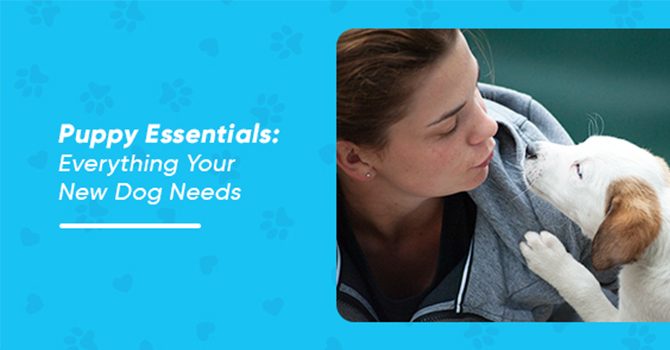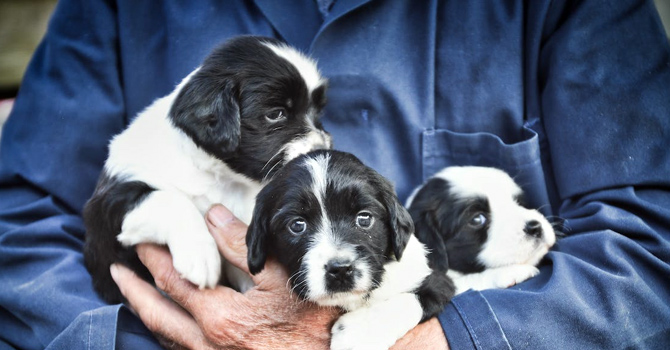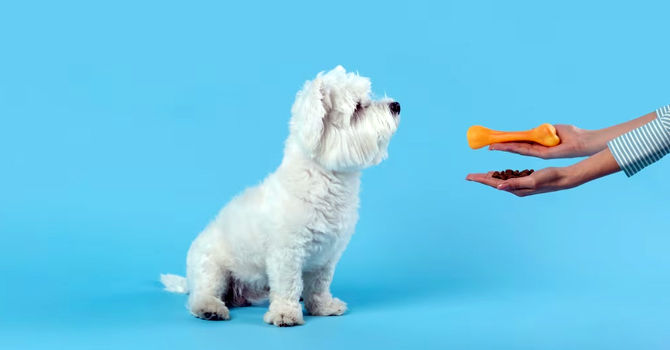Puppy Essentials: Everything Your New Dog Needs
July 28, 2023 in Dog Training Tips | No Comments

Bringing a new puppy into your home is a heartwarming experience filled with love, laughter, and countless memories waiting to be made. As you embark on this adventure, it’s essential to recognize the immense responsibility that comes with caring for a furry friend. Providing your new companion with the best start in life will set the foundation for a happy and healthy bond between you. The early days of your puppy’s life are crucial, and that’s why we’ve crafted this guide to help you navigate through the essentials. It is recommended to take a basic training course from a dog training academy. From preparing your home to creating a nurturing environment, we will cover everything you need to welcome your new four-legged family member with open arms.
This blog will walk you through a comprehensive checklist of puppy supplies, essential training tips, and valuable insights into maintaining your pup’s health and well-being. Let’s dive into the exciting world of puppy essentials and ensure your new dog has the best possible start in life.
Tips to Prepare for Your Puppy’s Arrival
A. First things first – puppy-proofing your home. It’s essential to create a safe environment for your curious and adventurous furry friend. Identify potential hazards such as toxic plants, loose cords, and small objects that could be swallowed.
B. Choose a designated area where your puppy can sleep, play, and feel secure. This spot will become your puppy’s haven as they adjust to their new surroundings.
C. Research and select a reputable veterinarian for your puppy’s healthcare needs. Regular check-ups and vaccinations are vital for a healthy start in life. Having a trusted vet on your side will give you peace of mind and ensure your puppy receives the best possible care.
Checklist for Puppies
- High-quality Puppy Food and Treats: Choosing the right puppy food is crucial for your new dog’s growth and development. Look for a well-balanced diet specifically formulated for puppies, considering their age, size, and breed. Opt for reputable brands that meet AAFCO (Association of American Feed Control Officials) guidelines to ensure proper nutrition-rich food. Additionally, have some healthy puppy treats on hand for training and rewarding good behaviour. Taking a course in puppy training from a dog training academy in Kerala will help you follow the correct diet sheet.
- Food and Water Bowls: Invest in sturdy, non-toxic food and water bowls suitable for your puppy’s size. Stainless steel or ceramic bowls are excellent options as they are easy to clean and less likely to harbour bacteria. Ensure that the water bowl is always filled with fresh water to keep your puppy hydrated throughout the day.
- Puppy Formula (if needed): In some situations, puppies may require special formula milk. Especially if they are orphaned, rejected by their mother, or have health issues. Consult with your veterinarian to determine if a puppy formula is necessary and to get guidance on the proper feeding schedule. Provide home-cooked food instead of depending on ready-to-eat puppy foods.
Essential factors to consider for puppies

1. Comfort and Safety
- Soft and Cozy Bed or Crate: Providing your puppy with a comfortable and safe sleeping space is essential for their well-being. A soft and cozy bed or crate gives them a sense of security and a dedicated area to rest and relax.
- Collar with Identification Tag: Ensure your puppy wears a well-fitting collar with an identification tag containing your contact information. If you lose your puppy, this tag will help you reunite with your furry friend.
- Leash for Walks and Training: A leash is a must-have item for taking your puppy on walks and starting leash training. It enables you to maintain control and keeps your puppy safe during outdoor adventures.
- Puppy Gates and Barriers: Puppy gates and barriers are helpful tools to create boundaries within your home. They prevent access to certain areas and help with puppy-proofing, especially during the early stages of exploration and training.
2. Hygiene and Grooming
- Puppy-Safe Shampoo: Choose a mild, puppy-specific shampoo to keep your puppy’s coat clean without irritating its sensitive skin. Regular baths help maintain a healthy and fresh-smelling puppy.
- Dog Brush or Comb: Grooming your puppy regularly with a suitable brush or comb helps remove loose fur, prevent matting, and strengthens your bond through gentle touch.
- Nail Clippers or Grinder: Trimming your puppy’s nails is essential to avoid overgrowth and discomfort. Use a puppy-friendly nail clipper or grinder to carefully trim their nails, or seek assistance from a professional groomer or veterinarian.
- Ear Cleaner and Cotton Balls: Keep your puppy’s ears clean and free from excess wax or debris with a gentle ear cleaner and cotton balls. Performing regular ear cleaning helps reduces the risk of ear infections.
- Puppy Toothbrush and Toothpaste: Dental care is crucial for your puppy’s overall health. Get them accustomed to tooth brushing early on with a puppy-specific toothbrush and toothpaste, promoting healthy teeth and gums.
3. Training and Enrichment
- Puppy Training Pads or a Designated Potty Area: During the early stages of potty training, puppy training pads or a designated area with proper flooring can be a real lifesaver. It helps avoid accidents and establishes a routine. You can also get the proper dog training from a Dog training institute.
- Chew Toys and Interactive Toys for Mental Stimulation: Puppies love to chew, and providing them with appropriate chew toys not only helps with teething but also keeps them mentally stimulated and prevents destructive behaviours.
- Clicker and Treats for Positive Reinforcement: Positive reinforcement is a powerful training method. A clicker and tasty treats enable you to reward good behaviour and encourage your puppy to learn new commands.
- Enrichment Activities and Puzzle Toys: Engage your puppy’s mind with enrichment activities and puzzle toys that challenge their problem-solving abilities and prevent boredom.
- Health and Wellness
- Puppy Vaccinations and Deworming Medication: Stay up-to-date with your puppy’s vaccination schedule and deworming to protect them from various diseases and parasites.
- Flea and Tick Prevention Products: Fleas and ticks can pose health risks to your puppy. Consult your veterinarian for suitable preventive products to keep these pests at bay.
- First Aid Kit for Dogs: Be prepared for minor injuries or emergencies by assembling a first aid kit specifically for your puppy. It should include items like bandages, antiseptic wipes, and tweezers.
- Pet Insurance Considerations: Pet insurance can provide financial support in case of unexpected veterinary expenses. Research different insurance options to find the best coverage for your puppy’s needs.
The First Days with Your Puppy

Bringing your puppy home is an exciting and momentous occasion. Creating a positive experience during their arrival sets the tone for their entire life with you. Give them a warm, safe, and comforting space to explore at their own pace. Establishing a routine for feeding, playtime, and bathroom breaks helps them feel secure and aids in housebreaking. Introducing your puppy to family members and other pets requires patience and supervision to ensure a smooth transition and promote harmony among the furry members of your household.
Puppy Food Allergies
Food allergies can affect puppies just like they do adult dogs. A food allergy occurs when a puppy’s immune system reacts negatively to specific ingredients in its food. The dog training center provides proper knowledge regarding food allergies and dealing with them. The symptoms of a food allergy can vary and may include:
- Skin Infections: Common skin infections include itchy skin, redness, hives, rashes, and excessive licking or scratching.
- Gastrointestinal Problems: Diarrhea, vomiting, and flatulence.
- Ear Infections: Frequent ear infections or chronic ear irritation.
Common food allergens for puppies include:
- Protein Sources: Beef, chicken, lamb, and fish are commonly associated with food allergies.
- Grains: Wheat, corn, and soy are known allergens for some puppies.
If you suspect your puppy has a food allergy or any skin diseases, it’s essential to seek veterinary advice. The vet will conduct a thorough examination and may recommend an elimination diet to identify the specific allergen. Once the allergen is identified, your puppy’s diet can be adjusted to avoid triggering allergic reactions. Providing a balanced and hypoallergenic diet will help keep your puppy healthy and free from discomfort caused by food allergies. Provide healthy food with the necessary nutritional requirements.
Puppy Training Tips
Training your puppy is a rewarding journey that strengthens your bond. Teaching basic commands like Sit, Stay, and Come using positive reinforcement techniques builds trust and encourages obedience. Socializing your puppy with humans and other dogs fosters confidence and helps them become well-adjusted adults. Utilizing crate training and positive reinforcement during housebreaking sets them up for success. Remember, positive reinforcement is always more effective and kinder than punishment-based training, which can lead to fear and behavioural issues. If you want to join a course to train your puppy, it is highly recommended to join any puppy training course in a dog training center in Kerala.
Health and Wellness Care
Prioritize your puppy’s health with regular vet check-ups and vaccinations. Keeping up with their vaccination schedule ensures protection against common diseases. Learn about common puppy health issues and how to address them promptly. Maintain a balanced diet and regular exercise to keep your puppy physically fit and happy. Mental health is equally important, so engage them in play and mental stimulation to keep their minds sharp and stimulated.
Building a Strong Bond with Your Puppy
The key to a strong bond lies in love, patience, and consistency. Spend quality time with your puppy, offering affection and understanding their needs. Recognize signs of affection and trust, and reciprocate with care and attention. This deep connection will make your puppy feel secure and confident in your presence.
Conclusion
The joys and challenges of puppy parenthood are unparalleled. Reflect on the joy your puppy brings to your life, and embrace the responsibilities that come with it. Reiterate the importance of providing all the essentials for your puppy’s happiness and well-being. Emphasize the significance of responsible pet ownership, as your commitment to your furry companion will be the foundation of a lifetime of love and companionship. Also, try to take any course in a dog training center in Kerala to enhance your skills to manage your puppy.
our skills to manage your puppy.